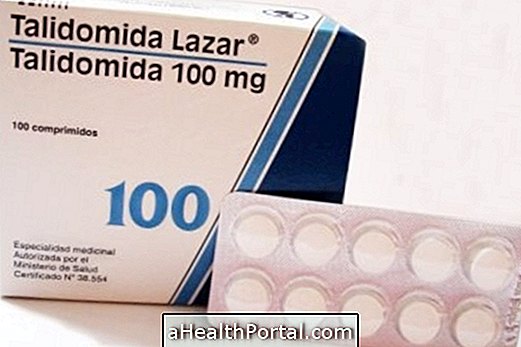Thalidomide is a medicine used in the treatment of leprosy which is a disease caused by a bacterial that affects the skin and the nerves, causing loss of sensitivity, muscle weakness and paralysis. In addition, it is also recommended in patients with HIV and lupus.
This medicinal product for oral use, in the form of tablets, can only be used at the recommendation of the doctor and is totally contraindicated in pregnancy and prohibited in women of childbearing age, between menarche and menopause, as it leads to poor formation of the baby, such as absence of lips, arms and legs, increased number of fingers, hydrocephalus, or malfunction of the heart, bowel and kidneys, for example. For this reason, in the case of using this medicine for medical indication, one must sign a term of responsibility.

Price
This medicine is for hospital use only and is provided free of charge by the government and is therefore not sold in pharmacies.
Indications
The use of thalidomide is indicated for the treatment:
- Leprosy, which is a leprosy type II or erythema nodosum type reaction;
- AIDS, because it reduces fever, malaise and muscle weakness:
- Lupus, graft-versus-host disease, because the inflammation decreases.
The drug's onset of action can range from 2 days to 3 months depending on the cause of the treatment and can only be used by women who are not of childbearing age and in children over 12 years of age.
Mode of Use
The use of this medicinal product in tablets may only be initiated on the advice of the physician and following a specific protocol for the use of this medicinal product which requires the patient to sign a consent form. Generally, your doctor recommends:
- Treatment of the leprosy reaction of the type nodosum or type II between 100 and 300 mg once daily at bedtime or at least 1 hour after the evening meal;
- Treatment of lepromatous nodosa and start with up to 400 mg per day, and reduce doses for 2 weeks until the maintenance dose is between 50 and 100 mg per day.
- HIV-associated debilitating syndrome : 100 to 200 mg once daily at bedtime or 1 hour after the last meal.
During treatment there should be no intimate contact and in case of occurrence you must use two contraceptive methods at the same time, as contraceptive pill, injectable or implanted and condom or diaphragm. In addition, it is necessary to start the prevention of a pregnancy about 1 month before starting the treatment and for another 4 weeks after the interruption.
In the case of men who maintain sexual activity with women of childbearing age should use a condom in any kind of intimate contact.
Side effects
The most common side effects of using this medication are in the case of being used by the pregnant woman leading to malformations in the baby. In addition, it can lead to tingling, pain in the hands, feet and neuropathy.
Gastrointestinal intolerance, drowsiness, dizziness, anemia, leukopenia, leukemia, purpura, arthritis, back pain, low blood pressure, deep venous thrombosis, angina, infarction, agitation, nervousness, sinusitis, cough, abdominal pain, diarrhea or arrest of belly, conjunctivitis, dry skin.
Contraindications
The use of this medication is completely contraindicated in pregnancy because it causes malformations in the baby, such as absence of legs, arms, lips or ears, and malfunction of the heart, kidneys, intestine and uterus, for example.
In addition, 40% of babies die soon after birth and are also contraindicated during breastfeeding because their effect is not known. It also can not be used in the case of an allergy to thalidomide or any of its components.




















